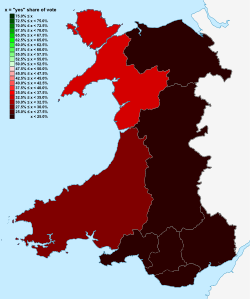Welsh referendum, 1979
| Welsh devolution referendum, 1979 | ||||||||||||||||||||||
|---|---|---|---|---|---|---|---|---|---|---|---|---|---|---|---|---|---|---|---|---|---|---|
| Do you want the Provisions of the Wales Act 1978 to be put into effect? | ||||||||||||||||||||||
| Location |
|
|||||||||||||||||||||
| Date | 1 March 1979 | |||||||||||||||||||||
|
||||||||||||||||||||||
|
||||||||||||||||||||||
The Welsh referendum of 1979 was a post-legislative referendum held on 1 March 1979 (Saint David's Day) to decide whether there was sufficient support for a Welsh Assembly among the Welsh electorate. The referendum was held under the terms of the Wales Act 1978 drawn up to implement proposals made by the Kilbrandon Report published in 1973.
The plans were defeated by a majority of 4:1 (20.3% for and 79.4% against) with only 12% of the Welsh electorate voting in favour of establishing an assembly. A second referendum to create a devolved assembly for Wales was held in 1997, which led to the enactment of the Government of Wales Act 1998 and the creation of the National Assembly for Wales in 1999.
Both the Scotland Act and the Wales Act contained a requirement that at least 40% of all voters back the plan. It had been passed as an amendment by Islington South MP George Cunningham with the backing of Bedwellty MP Neil Kinnock.
Kinnock, the future leader of the Labour Party, called himself a 'unionist'. His stated view was that "between the mid-sixteenth century and the mid-eighteenth century Wales had practically no history at all, and even before that it was the history of rural brigands who have been ennobled by being called princes". He was one of six south Wales Labour MPs who opposed their own Government's plans, along with Leo Abse (Pontypool), Donald Anderson (Swansea East), Ioan Evans (Aberdare), Fred Evans (Caerphilly), and Ifor Davies (Gower).
...
Wikipedia

